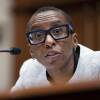Higher education experts fear the public battle over Claudine Gay and her resignation as Harvard University President could deter candidates from seeking top posts at colleges and universities, which already lack racial and gender diversity.
Adam Falk, president of the Alfred Sloan Foundation and former president of Williams College, told GBH News people will think twice before running the risk of getting publicly savaged by critics and forced to address profoundly divisive and politicized issues sweeping college campuses.
“College presidents are in an absolutely impossible position at the moment, trying to satisfy constituencies whether it's faculty or students or alumni or donors, each of whom think they have a primary call on the institution and want incompatible things,” Falk said.
In an op-ed titled “What Just Happened at Harvard Is Bigger Than Me” — her first comments since her resignation on Tuesday — Gay issued a warning, too. She wrote that the campaign against her “was merely a single skirmish in a broader war to unravel public faith in pillars of American society.”
“Trusted institutions of all types — from public health agencies to news organizations — will continue to fall victim to coordinated attempts to undermine their legitimacy and ruin their leaders’ credibility,” she wrote.
Vacancies among college leaders were already expected to rise, according to a 2023 report by the American Council on Education , which found more than half of college presidents said they plan to step down within the next five years. Yale University is also searching for a new president .
Gay’s resignation, a national spectacle, could exacerbate the problem. It also raises concerns about the widening racial gap between increasingly diverse students who attend US colleges and the predominantly white men who run them.
Some in higher education see Gay's departure as just the beginning, as politically conservative groups grow emboldened to attack “woke” campuses and their diversity, equity and inclusion efforts.
John D. Sailer, a senior fellow at the National Association of Scholars, a conservative group, told the New York Times he thinks there are "major problems" with higher education and Harvard is a representation of that.
“To the extent those problems have been exposed,” Sailer said, “I think that puts a lot of wind in the sails of reform.”
Falk said Gay’s experience at Harvard exemplified the bind college presidents increasingly face. Falk himself came under fire during his tenure at Williams, when he canceled a speech by a white supremacist, and was subsequently criticized during a U.S. Senate committee hearing.
“The demands that are put on institutions like Harvard in this moment are incoherent and self-contradictory: To both be a place that people feel safe and a place that anyone can say anything,” he said.
Susan Greenberg, senior editor at Inside Higher Ed said she is also worried about whether anyone would want to take a top university job in the current environment.
“It gives me a sense of foreboding for the future of higher ed,” she said. “Already presidential tenures have gotten shorter over the years. It's a difficult job and it's only getting harder by the hour,”
The tenures of college presidents have steadily shortened, according to the American Council on Education’s report, down from 8-and-a-half years in 2006 to less than 6 in its most recent survey.
“It's harder to attract really good people to do these jobs if they feel that their positions are as tenuous as I think many leaders feel today,” Falk said. Harvard and other institutions will have to "appoint somebody who is prepared to withstand a lot of heat coming from every direction. And I think that's true of all of the institutions that are looking to appoint new presidents today.”
In her op-ed Gay revealed she had been targeted by a barrage of hateful emails, including death threats.
“I have been called the n-word more times than I care to count,” Gay wrote.
Gay's resignation comes after University of Pennsylvania President Liz Magill resigned last month in the wake of the congressional hearing where both were criticized for not forcefully denouncing antisemitism.
Their departures followed the Supreme Court decision in June that struck down race-conscious decisions in college admissions.
Greenberg said the wariness on college campuses due to political conflict will only deepen, and that will affect not only the administration, but students.
“I do think it's going to make everybody look much more closely at how they hire and who they hire, as well as students they admit and how they admit them,” she said.








